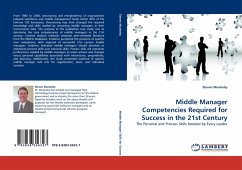
Project Competencies of Consultancy firms in Sweden
Perceptions of Project Management Practitioners
Versandkostenfrei!
Versandfertig in 6-10 Tagen
32,99 €
inkl. MwSt.

PAYBACK Punkte
16 °P sammeln!
This study explores, describes and analyzes the various characteristics of interproject learning mechanisms and project competencies found in a sample of consulting firms in Sweden. The study focuses on the perceived importance of different interproject learning mechanisms and their perceived impact in developing project competencies in consulting firms. The study interrogates the perceptions' of key' informed project management practitioners, who have experience of managing projects. Their perceptions about project activities in their respective firms helped capture a managerial' and provide ...
This study explores, describes and analyzes the various characteristics of interproject learning mechanisms and project competencies found in a sample of consulting firms in Sweden. The study focuses on the perceived importance of different interproject learning mechanisms and their perceived impact in developing project competencies in consulting firms. The study interrogates the perceptions' of key' informed project management practitioners, who have experience of managing projects. Their perceptions about project activities in their respective firms helped capture a managerial' and provide an expert' view. The study find that the most highly ranked and valued interproject learning mechanisms involved some degree of face-to-face interactions. Learning mechanisms that enable the capture, storage and transfer of explicit knowledge, though important, were not ranked highly in importance as person-to- person communication. The difference might be due to the efficient way the lattermechanisms have in transferring socially embedded and context-dependant tacit knowledge, which comprise a large part of knowledge applied in projects.












